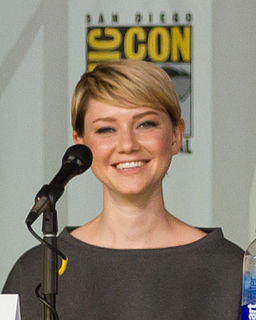A Quote by Michael Giacchino
I always thought of 'Lost' as a psychotic opera. Because there were so many characters, it was important for me to track them with themes.
Related Quotes
First, my frame of reference for the Britten opera shifted. I'd always thought of Britten's approach in Death in Venice as another exploration of the plight of the individual whose aspirations are at odds with those of the surrounding community: his last opera returning to the themes of Peter Grimes. As I read and listened and thought, however, Billy Budd came to seem a more appropriate foil for Death in Venice.
My first experiences with fashion were dressing up. It was always about fantasy for me. Dressing up as characters . . . I always thought that's what clothes were - that they would make you into the person you wanted to be. I'm an actress, so I love to act, and I think that's one of the most important things - the thing that makes you feel like another person.
I've always thought that Boathouse Row looked best at night, when hundreds of electric lights outline the shape of each building, truning them into fantastic postcard themes. I knew, however, from many visits to Boathouse Row, that at the same time, armies of rats were holding maneuvers in the basements.
I've always loved opera; it never occurred to me that I would write a proper libretto. One of my closest friends is a composer, Paul Moravec, and a few years ago, Paul and I were at lunch, and I said to him, "you really have to write an opera." So, he says very casually to me, "I'll do it if you write the libretto." Well, little did I know that the within a couple of years we would end up getting a commission from the Santa Fe Opera to write an opera together, "The Letter," which turned out to be the most successful commissioned opera in the history of the Santa Fe Opera.
We learnt a lot because we got in with real choreographers who tell you what they need from a song, because a song has to advance the story. Then real directors like Mike Nichols tell you where you can have 'B themes' and 'C themes', and we go oh yes, B themes and C themes! So we were taught in the finest school amongst the finest people. And also by the school of experience.
Opera was an enormous part of my childhood. My parents were both opera buffs, and they met in the box seat of an opera performance. And I also was a boy soprano, so before puberty hit, I was onstage playing a wide variety of orphans and urchins in all sorts of operas, and the sheer melodrama of their stories was just always appealing to me.
Introduce your main characters and themes in the first third of your novel. If you are writing a plot-driven genre novel make sure all your major themes/plot elements are introduced in the first third, which you can call the introduction. Develop your themes and characters in your second third, the development. Resolve your themes, mysteries and so on in the final third, the resolution.
The work on satisfactory formulation of technical patents was a true blessing for me. It compelled me to be many-sided in thought, and also offered important stimulation for thought about physics. Following a practical profession is a blessing for people of my type. Because the academic career puts a young person in a sort of compulsory situation to produce scientific papers in impressive quantity, a temptation to superficiality arises that only strong characters are able to resist.









































